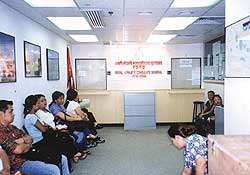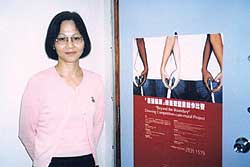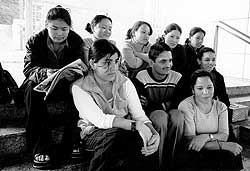 Twenty-seven-year-old Regina sits pensively on a sofa in a tiny apartment in Hong Kong's central neighbourhood as Chinese soap opera stars jabber away on television in a language that sounds both harsh and alien to her.
Twenty-seven-year-old Regina sits pensively on a sofa in a tiny apartment in Hong Kong's central neighbourhood as Chinese soap opera stars jabber away on television in a language that sounds both harsh and alien to her. Beside her, 21-year-old Amisha ruefully cuts her long painted nails on the sharp instructions of Ms Chan, the women's domestic employment agent in Hong Kong. "You can't afford to have long nails if you're here to work, it's not hygienic," says Chan, a stern, no-nonsense woman who picked the women up at the airport. The entire trip from the airport to the agency's boarding house is interspersed with Chan's instructions-a long list of household do's and don'ts, and upon arrival an impromptu lesson in lighting a gas stove and cleaning the bathroom.
Both the women, one a married mother of two, the other a college student, have arrived in this bustling Chinese territory to fulfill a two-year contract as domestic workers. "I know it's going to be hard working in a foreign country where the language and culture is unfamiliar," says Regina. "There's no one to love you, people only expect you to work." She left behind an ailing husband and a five and 10-year-old in the care of her elderly mother so that she can earn enough money to pay debts and her husband's medical fees.
Armed with a smattering of Cantonese, very little English, and the basics of Chinese cooking, Regina is nervous about meeting her employers and fulfilling the long list of household duties she is expected to carry out in Hong Kong. But she is determined to stick it out. "I can't go back without making some money. I'd be letting my family down."
 Despite her parents' disapproval, Amisha decided to quit college and come to Hong Kong to see life in a big city. "I know I can make much more money in Hong Kong as a domestic than working in Nepal with a college degree." By Nepali standards, the US$421 minimum monthly salary for domestic work is a lot of money. Although both women have agreed to pay their agents six months' salary in return for getting them a job, Regina says: "Even then I'll make more money than I would back home. And if I'm careful, I can save. It's hard to say what kind of employer I'll get, good or bad. But given time I'm sure I'll adjust. I've heard of some bad experiences but also about some domestics who've got great employers."
Despite her parents' disapproval, Amisha decided to quit college and come to Hong Kong to see life in a big city. "I know I can make much more money in Hong Kong as a domestic than working in Nepal with a college degree." By Nepali standards, the US$421 minimum monthly salary for domestic work is a lot of money. Although both women have agreed to pay their agents six months' salary in return for getting them a job, Regina says: "Even then I'll make more money than I would back home. And if I'm careful, I can save. It's hard to say what kind of employer I'll get, good or bad. But given time I'm sure I'll adjust. I've heard of some bad experiences but also about some domestics who've got great employers." There are 240,000 live-in domestic workers in Hong Kong, a territory of 6.8 million people. About 100,000 are from the Philippines, followed by Indonesians, Thais and Nepalis. An estimated 1,500 Nepali domestics work in Hong Kong, but the number is likely to grow as Hong Kong agencies see Nepal as a viable recruiting centre. "Nepali domestics are simple. Some of the educated ones speak good English and are less likely to make trouble with unions," says Chan, an agent who runs a recruiting and training centre in Kathmandu where eager applicants are taught Cantonese, the basics of Chinese cooking and interviewed by potential employers via the Internet.
Such employment outfits are an increasing cause of concern for groups like the Hong Kong-based Far-east Overseas Nepali Association (FEONA), a non-profit social organisation that works with Nepali migrants in Southeast Asia. "They're trying to legalise illegal matters," says Prem Chandra Rai, coordinator of FEONA who says that some agencies in Nepal charge around Rs 70,000 as agency fees
"They work with agencies here and make applicants sign a paper saying they have taken a six-month loan from the agency. That's totally false. Once they sign the contract, the worker needs to pay," Rai adds. "People don't have a clue and are in a hurry to come to Hong Kong. They take advantage of that weakness." There is concern that problems already occurring in places like Indonesia are likely to be duplicated among Nepali workers.
This is illegal in Hong Kong, where the rule is that workers can have up to 10 percent of the first month's salay deducted after a job is found. But usually a recruiter or agent will have the workers sign contracts that they don't normally read or that are in English and often not translated explained Kim Warren, manager at the Christian Action's Domestic Helpers and Migrant Workers Programme in Kowloon. "So a worker from Nepal, India or Sri Lanka may work for less than $100. Underpayment and non payment are common, especially among Indonesians for up to a year," says Warren.
 The agency's eight staff members are hard pressed providing the endless stream of domestic and migrant workers free paralegal advice on job and immigration problems. The centre also manages two shelters for domestic workers and has placement, training and language classes to help them integrate into mainstream Chinese society. It is not always easy, judging from the experiences of other Nepali migrants here, the majority of who work in construction, security and sectors like cleaning, restaurants, bars and nursing homes.
The agency's eight staff members are hard pressed providing the endless stream of domestic and migrant workers free paralegal advice on job and immigration problems. The centre also manages two shelters for domestic workers and has placement, training and language classes to help them integrate into mainstream Chinese society. It is not always easy, judging from the experiences of other Nepali migrants here, the majority of who work in construction, security and sectors like cleaning, restaurants, bars and nursing homes. Some 30,000 to 40,000 Nepalis live in Hong Kong. Many in the Nepali community were also born to former British Gurkha families and their dependents. But opportunities also come with costs. As the numbers of those like Regina and Amisha increase, the need for social support becomes crucial in an alien environment.
Most Nepali workers don't have money since they have to commit their first six months' salary to the employment agency. There are some women working in entertainment clubs and even as prostitutes. Lower levels of education, language problems, and sense of marginalisation can make adjustment harder.
"The language problem is immense," says Ah Ming, a Hong Kong social worker who helps Nepalis. "Many people come from villages, the (local) mothers don't speak English, they are not educated and so are difficult to integrate into mainstream Chinese society. Discrimination is everywhere, but it is hidden." (IPS)
Nepali workers in Hong Kong interviewed for this article did not want their real names used, nor their pictures taken.
Rita's story
 Rita has been living in Hong Kong since 1996. A Nepali Hong Kong ID holder, she runs a small roadside stall in Kowloon selling trinkets. "Life in Hong Kong has been okay, it's a good place to make money. But I really miss my children," said Rita, on a rare visit home. Her husband is also an ID holder, and works odd jobs as a construction worker.
Rita has been living in Hong Kong since 1996. A Nepali Hong Kong ID holder, she runs a small roadside stall in Kowloon selling trinkets. "Life in Hong Kong has been okay, it's a good place to make money. But I really miss my children," said Rita, on a rare visit home. Her husband is also an ID holder, and works odd jobs as a construction worker. The couple's two children, a four-year-old daughter and a 14-month-old son live with their grandparents in Nepal. "I left my son when he was five months old. He's really grown. I'm just happy that in the last couple of days he's become quite familiar with me," says Rita as she spends a few precious days with her children in Kathmandu before returning to Hong Kong.
"Ideally, we'd love to take them to Hong Kong. My parents love my daughter but they can't give her the help she needs with her school work, but nurseries and kindergartens in Hong Kong are expensive. And we're often busy at work. Maybe when they're a bit older."
Familiar with Hong Kong, reasonably comfortable with Cantonese and a mother-like figure, today Rita is developing into a champion for a group of Nepali migrants joining the Hong Kong workforce as domestics. "I know at least 20 domestics who come to visit me on their days off, when we chat about home, prepare Nepali meals, go for barbeques and just talk about life and our kids (see, pic). They often don't have money since they've committed their first six months salary to the agency. They call when they are in trouble. Outside of the homes they work in, they don't really know anyone, they're alienated. I try to help as much as I can."
Helping often means providing petty cash, counseling and complaining to the employment agencies about an employer's mistreatment, or even threatening to report them to the labour tribunal.
"Only two of the girls I know say they have employers who treat them well. The rest are not happy and will probably return to Nepal after saving some money and their two-year contract ends."


